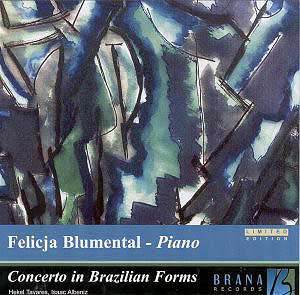Blumental is the linking factor between this disc and
Brana's BR0001 Villa-Lobos Live!
The recordings on this disc seem, in the case of the
Tavares and the Spanish Rhapsody, to be in mono and all can fairly
be described as historical though not historic.
The Tavares is written for fun and entertainment. It
is an audacious confection in which Beethovenian serenity (Moonlight
Sonata and the middle movement of the Emperor) meets the
passion of Rachmaninov (Paganini Rhapsody and Second Piano Concerto).
De Falla's Nights in the Gardens of Spain and Brazilian popular
dance forms (not as much of the Brazilian dance material as you might
have guessed) also make an unmistakable presence. There are times when
you are sure Tavares is ram-raiding Rachmaninov. The recording is rather
thin-sounding and one-dimensional as befits the original LP but it is
serviceable enough. The orchestra plays with fire in their bellies for
Fistoulari. The LSO are a class act beside the Torino and Trieste orchestras.
The Albeniz works sparkle with life or sing with grace
even more so than the Tavares. Indeed in the company of the Tavares
concerto they sound positively profound. The Rhapsody, by the way, is
also known as the 'Second Piano Concerto' though it is only just over
twelve minutes duration and in a single movement. The orchestra can
sound rather squealy (e.g. 4.47). The work itself is a gentle enough
meditation on the Iberian dream - more reticent reflection than virtuoso
bash.
The best sounding recording is that of the Piano Concerto
No. 1. The acoustic suddenly opens up after the comparative constrictions
of the Tavares and the Rhapsody. I have known this work for many years
via a tape of a broadcast of the original LP. Romantic phrases are elegantly
turned and spun and Blumental is brilliant to match. While the first
movement is over-extended the second (reverie e scherzo) and
the third, an allegro, have some lovely ideas which place it
in company with the Scriabin and Arensky
works. Listen to the playful sunlight of the dancing Dvořákian
allegro figuration at 1.50 in the finale.
These must surely be recordings from the 1950s. The
documentation does not help me with putting dates and locations to the
sessions. The recordings have been reclaimed, presumably from cherished
LPs, by The Classical Record Company (www.classicalrecording.com). The
restoration has been well done with every spot and click removed and
a clean and fairly natural sound delivered.
Given that the first two CDs from this company are
centred around recordings made by Felicja Blumental I wonder if there
is some family connection with the firm or is it simply that Brana is
run by Blumental fans? Whatever the background may be this is a fascinating
disc and the record catalogue is the richer for Brana’s presence albeit
reticently untrumpeted.
Rob Barnett


